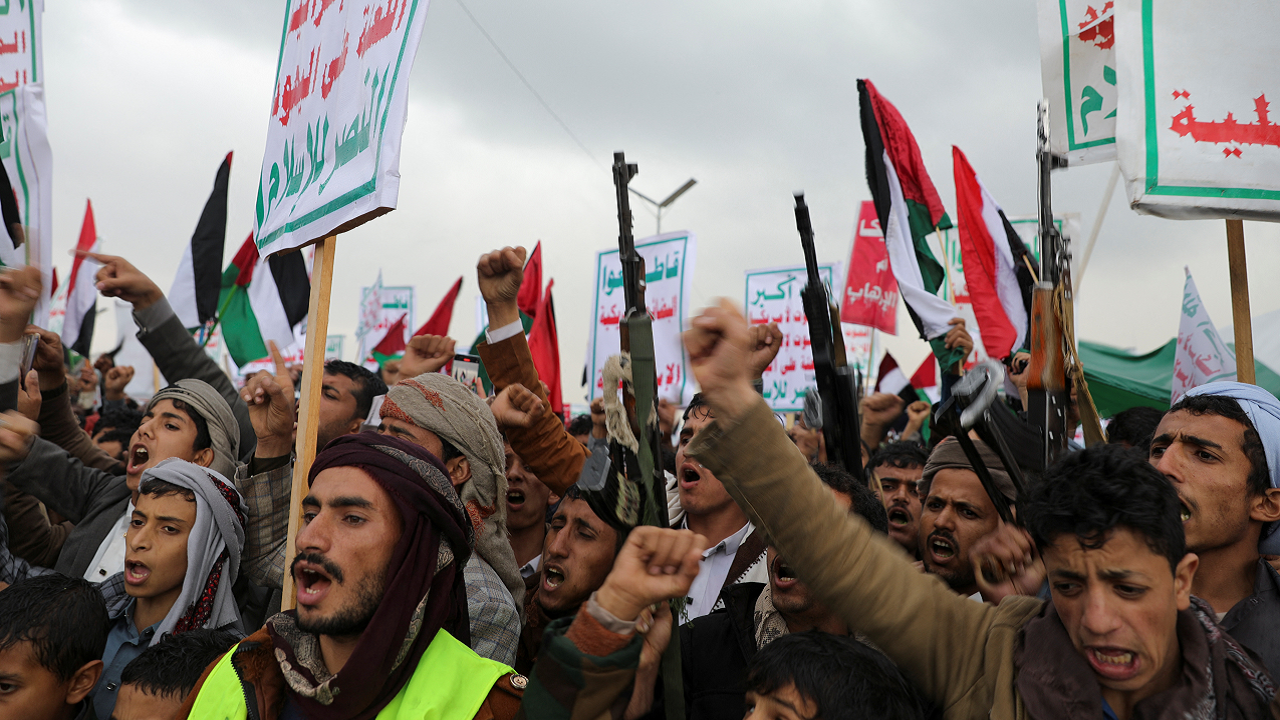Yemen Houthis' Resilience: Despite Bombing, Resistance Continues
Can a nations resolve truly be tested by the relentless thud of bombs and the chilling wail of air raid sirens? The ongoing conflict in Yemen, where the Houthi rebels have defiantly withstood years of bombing campaigns, offers a stark testament to the enduring power of resistance.
The skies above Yemen have long been scarred by the contrails of warplanes, their payloads aimed at shattering the Houthis ability to wage war. Yet, despite the deafening explosions and the destruction that has followed, the group continues to launch strikes, most notably on Israel and U.S. assets, demonstrating an unexpected tenacity. The international community has been observing with mounting concern as the conflict threatens to destabilize the already volatile region, and with a potential risk of a broader conflict in the Middle East.
The Houthis, also known as Ansar Allah, have emerged as a formidable force in Yemen's complex political landscape. Their roots trace back to the 1990s, evolving from a religious and political movement championing the Zaidis, a Shia Muslim minority, into a powerful military entity. Their ascent was fueled by a blend of grievances, a desire for autonomy, and shrewd maneuvering in the chaotic aftermath of Yemen's civil war.
In recent weeks, the strategic calculus of the conflict has undergone a dramatic shift. Millions of Israelis have been forced into bomb shelters at night, not due to attacks from Gaza, Lebanon, or Iran, but by missiles launched by Houthi militants in Yemen. This change has significantly escalated tensions, forcing the United States and its allies to re-evaluate their strategies.
The United States, under various administrations, has been involved in the conflict, with policies ranging from targeted drone strikes to broader bombing campaigns. Johnsen, in his assessments, explains that the rationale behind the actions of the Trump administration and how that will affect the Houthis, however the results have been quite the opposite. The Houthis have shown a remarkable ability to endure and even thrive, despite the military might arrayed against them. The debate has raged whether the focus should have been on humanitarian aid to solve the crisis rather than bombing, this is something that is widely debated across the globe.
The Houthi's ability to withstand these immense military pressures raises serious questions about the effectiveness of the current strategies. Are airstrikes and bombings the answer? Or is a more nuanced approach, one that addresses the underlying grievances and seeks a political solution, the only path to long-term stability? The answer remains elusive, shrouded in the complexities of the conflict.
The Biden administration, in an attempt to balance humanitarian concerns with security interests, removed Ansar Allah from the Foreign Terrorist Organization (FTO) blacklist in February 2021. This decision reflected concerns about the potential impediment to humanitarian aid deliveries amidst a worsening political and humanitarian crisis. However, the debate about whether to engage with them as a formal political entity or not continues to stir heated debate. The risk has been the rise of a more aggressive, dangerous group.
The role of external actors further complicates the picture. Regional powers have become deeply enmeshed in the conflict, with their own geopolitical agendas influencing the dynamics on the ground. The Houthis' regional ambitions are intertwined with broader Middle East crises, increasing the likelihood of a broader regional conflict. The increasing involvement of various actors on the ground creates a complex web of interests and alliances, making a peaceful resolution all the more difficult.
The international community's desire to isolate conflicts and prevent them from spreading has been met with limited success. As one expert warned, there is a significant risk that the conflicts could merge and spiral out of control. This could lead to increased instability and human suffering, which further underscores the urgent need for diplomatic solutions and a more comprehensive approach to addressing the root causes of the conflict.
The path forward remains uncertain, with multiple actors vying for influence and control. What is clear, though, is that the people of Yemen have paid a terrible price, and the need for a lasting peace has never been greater.
The internal dynamics and how the Houthis have survived are also a vital piece of understanding. The Houthis are an armed political and religious group which champions Yemen's Shia Muslim minority, the Zaidi, and they have taken on the role of political entity, their strength is in the belief of their people, something that is often forgotten in the equation.
The recent revelations about how top Trump officials shared plans to bomb targets in Yemen over a messaging app have raised serious questions about the decision-making processes and the potential for external influence in the conflict. The ability to defeat the Houthi with airstrikes, something that military analysts are already doubting, further complicates the situation. The complex interplay between military actions, political maneuvering, and humanitarian concerns will continue to shape the course of the conflict.
The international community must work together to find a peaceful resolution to the conflict in Yemen. This will require all parties to the conflict to come to the table and find a solution. This is the only way to avoid further suffering and instability in the region. The people of Yemen, caught in the crosshairs of a brutal conflict, deserve nothing less.
The impact on the people of Yemen is not something that should be taken lightly, there are widespread issues of poverty, hunger, and disease. The ongoing fighting has damaged the infrastructure and has disrupted the delivery of essential services. The international community must take action to ensure that basic services are restored and that the Yemeni people get the help that they deserve.


